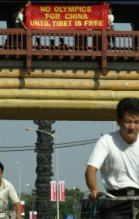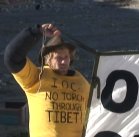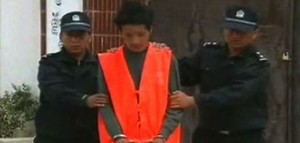Why speak out for Tibet during the Olympics?
This is why.
From the Huffington Post:
Guilty of Being Tibetan: Scenes from a Lhasa Prison
“Before, this was the best place, but now it’s like a prison. When I watch TV, everything is lies. So I walk in the streets where the soldiers ask for my identity papers. If there’s the smallest mistake, you’re finished. We should be tolerant but we can’t be tolerant any more.”
This is how one young Tibetan man describes life in Lhasa these days in an interview that was smuggled out of Tibet.* It’s a rare eye-witness testimony by someone who was jailed in the aftermath of the protests in March this year.
This same individual (whose identity is withheld for obvious reasons) describes his arrest and subsequent experiences at Lhasa’s Gondzhe detention center. Chinese police entered his house “broke down five doors, checked everything, threw it all on the floor and hit everyone present. It was like a burglary.”
After he arrived at the prison, the man says that the guards beat him around the head. “At first I thought they were going to kill me…They gave us half a steamed bun a day. Everyone was very thirsty and a lot of people drank their own urine. We had no clothes, no blankets, nothing to lie down on, and it was very cold. For four days nobody spoke to us. They just left us there.”
He describes the monks being singled out for particularly harsh treatment. “I’m very worried about the monks. The soldiers regard [them] as something very different…I can’t understand why they do terrible things to monks.”
“I met an old man who had two ribs broken. He was all bent over and couldn’t stand up straight. He was dying, so the police took him to People’s Hospital….The people who are taken to hospital are usually people who have been shot or beaten, and they usually die there. A brother and sister were sleeping in the same room and all of a sudden soldiers came and threw them out of the window from a high floor to the ground. The brother was killed on the spot. The sister didn’t die, but she can’t lie down, she has to remain in a sitting position all the time. They took the body away and told her that she is forbidden to tell anyone.
I didn’t see the dead people, but in prison people called out to the police or soldiers, “Someone’s dead!” Every day people shout that.” He says that one man was beaten to death for owning a jacket that the guards suspected he’d stolen. “I can’t believe we are in the 21st century”.
One man was beaten to death for owning a jacket that the guards suspected he’d stolen. “I can’t believe we are in the 21st century“.
The man interviewed goes on to recount how a seventeen-year-old high school student who hadn’t even participated in the protests was subjected to torture. “Afterwards, he said that he’d done all kinds of things. That happens to a lot of people. They pressure people to admit things they never did….Many questions were asked of people who are not guilty of anything. They are just guilty of being Tibetan.”
Even though the man who witnessed these things has been released, his movements and activities will certainly be monitored from now on.
“I have a relative in India. I wrote just what I heard and saw, to send over the Internet. I wrote a little and saved it on Word. All of a sudden it disappeared, so I was very frightened. So I haven’t checked my e-mail. I have a lot of friends abroad and they send many e-mails but I haven’t opened them.”
In a poignant moment, he recalls how he used to complain about his family’s cooking. “In prison I sometimes dreamed about food. I would remember my mother’s and my sister’s cooking, and I really appreciated how tasty the food is at home.”
But even after everything he’s seen and been through, the stubborn Tibetan knack for finding meaning in adversity is revealed in this young man’s response to his experience. “These are the worst things that I’ve ever seen in my life,” he says, “but you learn how to be a good person.”
*Source: Tibetan Center for Human Rights & Democracy
Rebecca Novick is a writer and the Executive Producer of The Tibet Connection radio program. She is currently based in Dharamsala, India.
Posted: August 1st, 2008 under News.
translate:
Comments: none











Write a comment